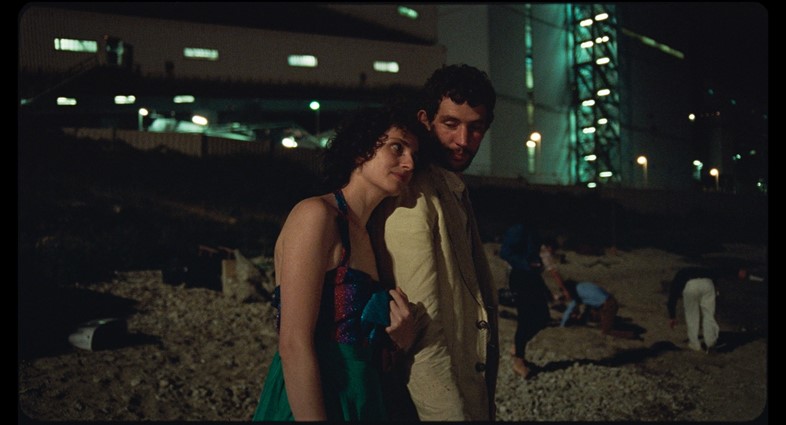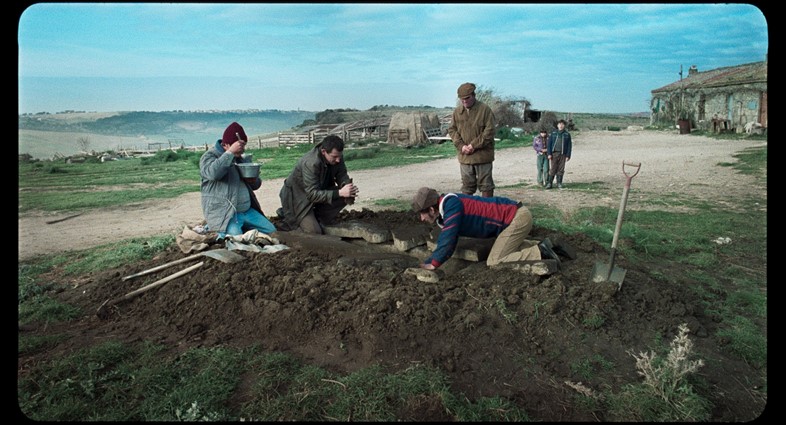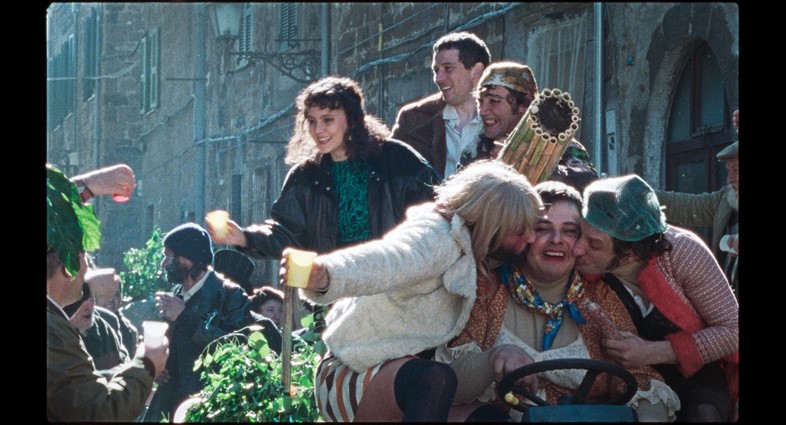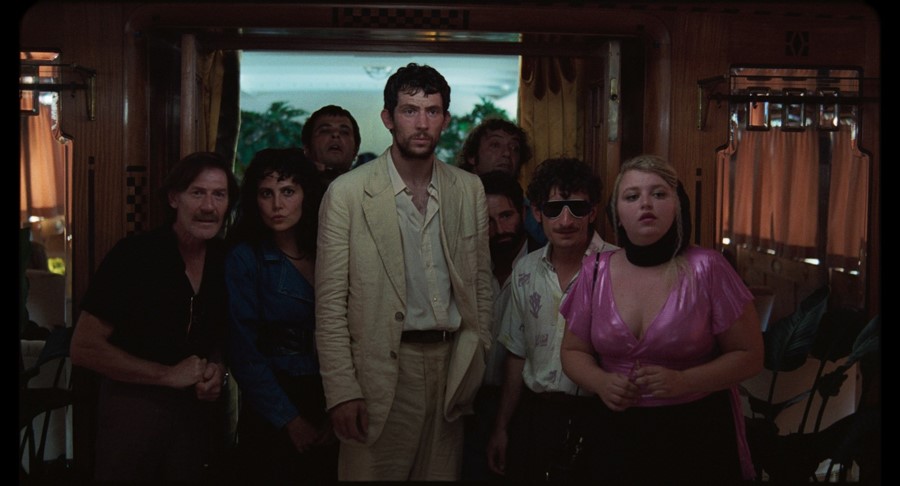As La Chimera is released in the UK, we revisit our interview from Cannes with director Alice Rohrwacher and actor Josh O’Connor, who discuss the afterlife, grave digging and grief
In La Chimera, two characters start communicating through sign language for no other reason than they are in love. So when Josh O’Connor walks into our interview with the film’s director, Alice Rohrwacher, and the two begin signing excitedly at each other, it looks suspiciously like the real thing. “When you work with an auteur like Alice it’s the closest thing to love,” says O’Connor, who learned to speak Italian for the film, as well as a smattering of sign language. “There is an alignment of vision and ideas and I’m not ashamed to say she’s had a big impact on me as a filmmaker.”
Rohrwacher’s film tells the story of Arthur, an Englishman of apparently supernatural gifts who has fallen in with a group of grave robbers in 1980s Tuscany. These men seek their fortunes by plundering old Etruscan tombs for treasures to be sold via a mysterious fence, Spartaco, on the international art market. But Arthur has his own reasons for desecrating these old shrines: grieving the loss of his girlfriend, Beniemina, he is searching for a portal to the afterlife that will bring him back to her. Coming between them is Italia (Carol Duarte), a maid at the crumbling old palazzo owned by Beniemina’s mother (Isabella Rossellini) who sees a kindred spirit in this interloper, if he could only pull his head from the grave just long enough to see it.

That’s the bare bones of it, anyway, but in truth La Chimera is a world unto itself, a heady and intoxicating blend of the everyday and the elevated, the sacred and the profane that seems drunk on the possibilities of the medium. In several scenes, Rohrwacher speeds up the action when we see the robbers fleeing from the police, a comic device that takes on sudden weight with a shot of waves lapping at the seashore, inviting us to ponder the passage of time. In another, there’s a breathtaking shot of a mural in an old Etruscan tomb oxidising when brought into the light for the first time in three millennia. It’s the work of a filmmaker at the top of her game, beautifully anchored by O’Connor (The Crown, God’s Own Country), who is quietly staking his claim as one of the UK’s most fearless young acting talents.
Below, AnOther spoke to O’Connor and Rohrwacher on the eve of the film’s premiere at Cannes to learn more about their strange and wonderful paean to the power of the unseen.
Alex Denney: Josh, is it true you wrote to Alice asking to work with her on this film?
Josh O’Connor: Yeah, in anything! The story is that my younger brother, who is an environmentalist, he doesn’t see many films but [when he does] he’ll call me up and say, ‘I’ve just seen this film, it’s called The Spider-man!’ And he called me one day and said he’d just seen this film and it was incredible, and I was like [rolls eyes], ‘OK, was it Captain Marvel?’ He was like, ‘No, it’s called Happy As Lazzaro,’ and I was like, OK, so I went and saw it that day and I cried. I was like, if there was ever a filmmaker who was made for me, it’s Alice. So I wrote this thing and we met over Zoom. Alice said, ‘I have a project but you’re too young [for the part], but maybe one day,’ and I was like, it’s never gonna happen. And then a few months later, she rewrote the part as a younger [character] for me.
“I spent so long fascinated by this idea of the beyond, the void; I grew up Catholic where there is the concept of an afterlife” – Josh O’Connor
AD: What can you tell us about the Etruscans, whose treasures the grave diggers in the film are stealing?
Alice Rohrwacher: I grew up in a place where it’s impossible to plant a courgette without digging up some fragments of an artefact that was buried, so the relationship of soil with the underground is something that has always fascinated me and makes me feel very connected to the past. Where I grew up is Etruscan land, and the Etruscans are somehow a people I’ve always romanticised – I believe they were a lot sweeter than the Romans!
JOC: One thing I learned about the Etruscans is they didn’t build houses. They didn’t have structural buildings, and so you think, OK, maybe they hadn’t discovered building techniques or whatever. But then you go into these tombs and they are architecturally astonishing; they’re beautiful and ornate. And what’s interesting about that is that they saw death or the afterlife as the more important element of their lives. I do think there’s an element of the past where we’re losing, which is an acknowledgement of things we cannot see. Because we all have senses about something whether we’re aware of them or not; there is a consciousness that exists beyond the sort of base level. And so I think Arthur just has [this gift] that we all have the capacity for.

AD: Alice, when did you first become aware of the existence of these grave diggers in your community, and how did you feel about them then and now?
AR: The grave diggers were usually old men who would go out digging at night and then boast about their findings in the bar during the day, saying I found a vase or a whole sarcophagus, incredible stories connected to these hidden and disappeared objects; it was extremely common and it’s something that impressed me since I was a child. What impressed me most was not the obvious illegal aspects of these activities, but the fact they were violating these sacred places; they were taking objects that were meant to stay hidden and not to be seen by anyone. Why were they doing it? Because they no longer believe that those objects were sacred. And when do we not consider something sacred? When do we stop attaching any importance to the past life of those objects? These people had started to look at the past in a very different way and that impressed me right there. Because the amazing thing is that for two or three thousand years, those objects were not touched by human souls.
AD: The film is about a man struggling to deal with events in his own past, but it’s also a film about what we do with our own history as a culture.
AR: I’m unable to think of a story as a personal story, I always have to think of a collectiveness, of someone who is living as a member of a society. It’s a thought that is reassuring in my own life; the idea that there's something that is bigger than me somehow makes me feel less focused on my own identity. And [especially] now, when identity seems to be the focus and the centre of everything, I feel it’s my duty to tell the story not of an individual but of a community.
“Now, when identity seems to be the focus and the centre of everything, I feel it’s my duty to tell the story not of an individual but of a community” – Alice Rohrwacher
AD: Josh, your Italian sounds great in the movie, did you have to work hard on that?
JOC: I was living in New York when I was prepping the film and I did this course where you turn up every day at 9am and the tutor only speaks in Italian and you can only speak in Italian. The idea is immersion. I remember the first day at lunchtime, I was on my phone hiding in the loo, looking up how to ask for food, water and the toilet, because I felt I needed the basics. So I did a bit of that but I felt like I could only really learn it by being in Italy, and by the end I felt sort of comfortable enough.
AD: Alongside Italian we hear French, English and Portuguese in this movie. Why this diversity and why did you cast Josh?
AR: I feel that the Italian identity is mixed. It’s time to state this and to stress the fact that whoever lands in a country can belong to a country. And I’m saying this as the daughter of a foreigner [Rohrwacher’s father is German]. With Josh, I thought of having an Englishman to play Arthur, not because it had to do with the UK but because he speaks a language that is spoken in many countries of the world as the international language and that was important.

AD: The role looks like it must have been demanding, not only physically but also emotionally, because you have to dig into the grief so much.
JOC: Yeah, it was the most beautiful experience making the film, but also taxing. I spent so long fascinated by this idea of the beyond, the void; I grew up Catholic where there is the concept of an afterlife but as I’ve gotten older that fantasy has become less in me. So trying to tune myself into that for the film was difficult. And then there was the practical side of grief – I knew that physically I wanted to change significantly from the first half of the film to the second, so I lost a lot of weight. And it was particularly hard because I actually shot a film in between, for Luca Guadagnigno, where I had to be quite muscular, which I’ve never been in my entire life.
AD: Josh, what is it about Alice’s work that speaks to you?
JOC: When you work with an auteur like Alice it’s like the closest thing to love, there is an alignment of vision and ideas and I’m not ashamed to say she’s had a big impact on me as a filmmaker. You know, they’re all deeply political films that Alice makes. You wouldn’t necessarily take that on immediately, but they are. Also I think at heart we are both a couple of hippies. I lived in my camper van for the second half of the shoot by Lake Bolsena; I had a bicycle on the back and my plan was to use it to bike into the nearby town to get my food on Sundays when we weren’t filming. The first Sunday I got my bike out and started cycling down, but Italians really don’t care about cyclists and so I quickly aborted that mission, and then Alice very kindly drove down from her place with a canoe. So from then on every Sunday I canoed across the lake to the village, got my shopping and put it in the canoe to take back!
La Chimera is out in UK cinemas now.
